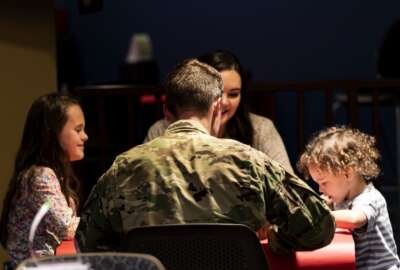Col. Christopher Reid wants to know, if service members are to blame for their own food insecurity, why do military bases need so many assistance programs available on site?
“To me, that is the nation saying that, ‘Hey, we know up front, you’re going to need supplementals,’” said Reid, a military fellow in the Center for Strategic and International Studies’ International Security Program.
Food insecurity affected one in five military families as of 2021 — up from one in eight in 2019 — according to the Military Family Advisory Network. The issue has existed for decades and has bipartisan support in Congress, but Lloyd Austin was the first secretary of Defense to publicly direct DoD to address food insecurity for military families, just last year. The 2022 National Defense Authorization Act called for a study of food insecurity in the armed forces with results due to Congress by Oct. 1, according to CSIS.
The issue links to global supply chain complications, inflation, government assistance programs and family needs. Caitlin Welsh, director of CSIS’ Global Food Security Program, wrote in a 2021 analysis that the Supplemental Nutrition Assistance Program, also known as SNAP or “food stamps,” eligibility is inconsistent and problematic.
“For service members who live on base, the income USDA uses to assess SNAP eligibility does not include the cost of on-base housing, as this cost is simply subtracted from the service member’s pay. For service members who live off base and receive a housing allowance — the Basic Allowance for Housing (BAH) — the income USDA uses to assess SNAP eligibility does include BAH, even though BAH is not considered as income for tax and other purposes,” she wrote. She went on to suggest USDA could work with Congress to exempt BAH from SNAP eligibility, as the Defense Department said it could create inequalities based on geographic location and family size.
Rep. Jim McGovern (D-Mass.), in a taped message for CSIS’s Policy Brief Launch: Solving Food Insecurity Among U.S. Veterans and Military Families on Tuesday, said he was perplexed that DoD has waited to study or address food insecurity for active and veteran service members until now.
“We did the hearing in the [House] rules committee that you referred to, we heard from experts who told us that our service members and veterans and their families need more support, to be able to put nutritious food on the table. They talked about improving data collection, removing the basic allowance, for housing from the SNAP calculation, base pay increases or expanding short term SNAP guarantee a smooth transition to civilian life,” he said. “But … there are answers, and there are solutions here that are simple.”
Military families struggle to make ends meet
Outside groups who have studied the issue of food insecurity in the armed services say the most impacted are junior-level enlisted service members in the E1 to E4 ranks, especially those with children. Modest pay, frequent moves that make it difficult for military spouses to find steady work, and an internal culture of self-sufficiency “leaves many reluctant to speak about their difficulties, for fear they will be regarded as irresponsible,” the Associated Press reported.
Although many soldiers rely on base dining facilities to supplement their and their families’ meals, during the pandemic those facilities closed. Much like how schoolchildren could not access lunch programs, affected service members had to look elsewhere, as Army Col. Danielle Ngo, another CSIS military fellow, pointed out.
She added the same goes for families who relied on child care providers — another scarce resource, pandemic or not — to serve daily meals. Ngo said that when she was stationed in Hawaii, she went through 11 child care providers in one year while waiting for a child development center to open. She was a brigade commander at the time but did not want to skip to the front of the line because she knew other soldiers could not afford off-base providers.
“So I looked off base to try to find child care, and it’s really hard to find qualified people who you trust to take care of your children and who will feed them a good healthy diet,” Ngo on the panel. “So it’s really important, good child care, so families don’t have to worry, soldiers don’t have to worry about how their children are being taken care of.”
Implications for military mental health
Food insecurity could have links to a separate concern in the military: mental health and suicide prevention. A separate survey of more than 5,600 respondents at a “major U.S. Army installation,” conducted by the U.S. Army Public Health Center and the Agriculture Department’s Economic Research, found that nearly 33% of respondents were marginally food insecure. The study authors said they were prompted by a commanding officer’s call to the Public Health Center to investigate a perceived increase in suicidal behavior and preventable deaths in 2019.
“Marginally food insecure” refers to individuals who report any indications of compromised economic access to food among themselves and their families.
“The mediation analyses showed that marginal food insecurity was significantly related to mental health outcomes (anxiety, depression, and suicidal ideation) which were related to intentions to leave after the current service period (full mediation). These results indicate that by addressing food insecurity, there will be subsequent positive effects for mental health and for reductions in intentions to leave the Army after the current service period,” the study authors wrote.
Last summer, Federal News Network reported the Defense Department would pilot a food insecurity assessment tool for military family counselors, to use in their meetings with military families. Patricia Montes Barron, deputy assistant Defense secretary for military community and family policy, said the reason was that food insecurity can be a hard conversation to have, even with a question as simple as “Did you eat well today?”
During CSIS’s panel on Tuesday, Reid said the stigma around food insecurity could be linked to the fact that that service members are essentially given everything they need to do their jobs when they enter the military, whether at a station or deployed, including tools, equipment, directives and uniforms. Then when they cannot provide food for themselves or their families without assistance, it takes a psychological toll and hinders readiness.
Copyright
© 2024 Federal News Network. All rights reserved. This website is not intended for users located within the European Economic Area.






